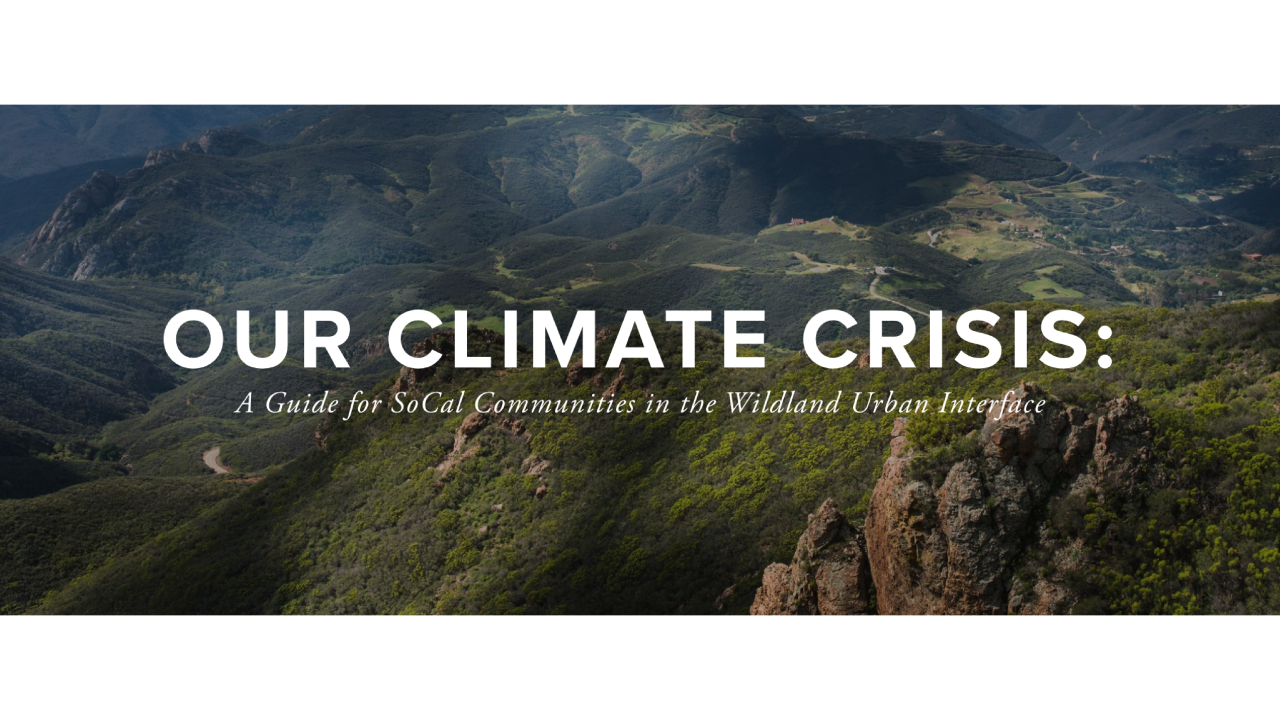In 2018, the Woolsey Fire burnt 96,949 acres of land, significantly impacting and even displacing some of the residents of Malibu and their surrounding neighbors. The Malibu Foundation was established in its wake, with a desire to better plan for a worsening annual wildfire season, among other natural disasters that could strike the area.
“We want to create a more climate resilient community,” said Shea Cunningham, climate resilience program consultant for the Malibu Foundation. “This community is fairly vulnerable to all these disasters that can occur: fire, landslides, storm surges, sea level rise, earthquakes — you name it.”
In partnership with UCLA and others, the Malibu Foundation forged ahead on a climate resiliency plan for the city and the greater Santa Monica Mountains region. The work ultimately culminated in the release of a report this week titled Our Climate Crisis: A Guide for Communities in the Wildland Urban Interface, which gives local communities a roadmap for how to adapt to and mitigate the impacts of the climate crisis.
In the spring of 2021, the foundation conducted the Resilient Santa Monica Mountains Climate Vulnerability Survey, which received about 400 responses from a broad regional geography including Malibu, Las Virgenes, Topanga, Pacific Palisades and more. The survey was broken up into different topic areas including fires, floods and droughts.
The project counts the Los Angeles County Office of Sustainability, Resource Conservation District of the Santa Monica Mountains, offices of Los Angeles County Supervisor Sheila Kuehl and California State Senator Henry Stern, Resilient Palisades, Climate Resolve and others as active stakeholders, and formed the Resilient Santa Monica Mountains Project Advisory Committee, of which Sustainable LA Grand Challenge executive director, Cassie Rauser was a member to engage these stakeholders and other expertise in the development of the regional resilience plan.
“It’s very much a community collaboration,” Cunningham said.
The UCLA Sustainable LA Grand Challenge is a partner with the Malibu Foundation, and helped facilitate Julissa Alvarado’s involvement with the project. Alvarado, who is a first-year graduate student at the Fielding School of Public Health supporting the project, worked to conduct outreach for the community surveys. She had previous experience working in environmental justice, and began her work on this current project in February, 2021.
Residents were surveyed about what kinds of sustainability measures they’d like to see implemented and what challenges they have personally faced. Alvarado also conducted an inventory of what resources are already available to residents.
“What made me really interested in this project is that it targets the impact of climate change, while introducing and identifying adaptation and mitigation strategies to improve resiliency in the community” Alvarado said. “There are disasters that are inevitable, such as wildfires. If I can learn more about these issues and develop a resiliency project, that can be really rewarding.”
Although property damage might be the most discussed aspect in the Woolsey aftermath, there is so much more to consider, Alvarado said. “It does affect people’s health, not only their homes.”
As the initial data and survey collection concluded, Alvarado helped conduct special in-person and virtual listening sessions. She reached out to the most vulnerable and unheard populations in the region including seniors, day laborers and the homeless.
A resiliency survey defines the strengths and weaknesses of the community and its ability to handle future natural disasters. “What challenges do we learn from, for example, previous wildfires and what can we learn in how to deal with those future events?” Alvarado added.
Proactive recommendations as a result of the survey include implementing a walkie talkie system for when cell phone coverage is disrupted, and more information on native and wildfire-resistant plants.
“We want this to have legs and be an actionable report,” Cunningham said. “We are hoping this will lead to actual adoption by the cities and utilized by different community groups, and hopefully serve as a beacon for other urban wildlife interface in California.”
Cunningham noted that having Alvarado on the project was particularly helpful, especially in regards to community outreach. Alvarado was able to better communicate with the day laborer population because she is bilingual, and she brought patience and grace to the vulnerable populations the survey sought input from. “She is bringing that angle to our project, which is very helpful,” Cunningham added.
The key to making a positive impact on the public is to make sure the public is engaged, Cunningham said, and having the premier public university in the region behind this project doesn’t hurt.
For Alvarado, she was appreciative of the opportunity to work with the Malibu Foundation and put her ongoing public health education to practice in the real world. “There are definitely ways that these climate change events are affecting people’s health. This is my first opportunity to really apply what we’ve been learning in the classroom to make a difference.”





